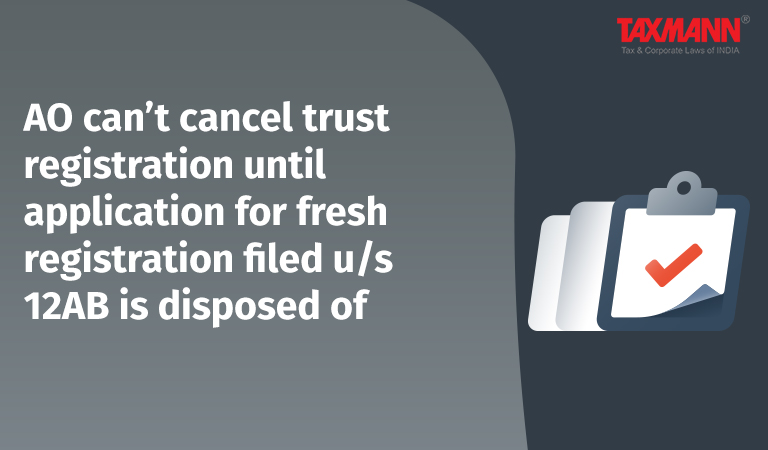AO can’t cancel trust registration until application for fresh registration filed u/s 12AB is disposed of
- Blog|News|Income Tax|
- 2 Min Read
- By Taxmann
- |
- Last Updated on 11 February, 2022

Case Details: S.R. Trust v. PCIT - [2021] 133 taxmann.com 418 (Madras)
Judiciary and Counsel Details
-
- R. Suresh Kumar, J.
- R. Sivaraman for the Petitioner.
- T.R. Senthilkumar, Sr. Standing Counsel for the Respondent.
Facts of the Case
The assessee was a public charitable trust registered under section 12A. The Finance Act, 2021 has introduced a new regime by way of section 12AA(5) with effect from 1-4-2021. According to such a regime, trust is required to make an application for fresh registration of trust by adopting the procedure under section 12AB.
The assessee had applied for fresh registration, and the same was pending. The Assessing Officer (AO) noticed some violations in dealing with its finance by the assessee and accordingly issued a notice under section 12AA(3) for cancelling registration. The assessee filed a writ petition against such notice before the Madras High Court.
High Court Held
The Madras High Court held that as per the newly inserted provisions of section 12AB, if an application is made for fresh registration by an already registered trust, such application shall be processed, and an order registering the trust for five years shall be passed.
Once such registration is granted for five years under the new regime, it is very open to the AO to invoke sub-sections (4) or (5) of section 12AB. He can very well verify whether any infringement or violation is noticed from the trust, and cancellation of registration can very well be taken as per the procedure established under section 12AB.
The word ‘subsequently’ occurred in sub-section 4 of section 12AB shall be construed as ‘subsequent to the registration. Thus, unless and until the application pending for fresh registration of trust is decided, the AO has no jurisdiction to issue the notice for cancellation of registration.
Check out Budget Marathon | Taxmann's one-of-a-kind Webinar for the Union Budget 2022-23
Disclaimer: The content/information published on the website is only for general information of the user and shall not be construed as legal advice. While the Taxmann has exercised reasonable efforts to ensure the veracity of information/content published, Taxmann shall be under no liability in any manner whatsoever for incorrect information, if any.

Taxmann Publications has a dedicated in-house Research & Editorial Team. This team consists of a team of Chartered Accountants, Company Secretaries, and Lawyers. This team works under the guidance and supervision of editor-in-chief Mr Rakesh Bhargava.
The Research and Editorial Team is responsible for developing reliable and accurate content for the readers. The team follows the six-sigma approach to achieve the benchmark of zero error in its publications and research platforms. The team ensures that the following publication guidelines are thoroughly followed while developing the content:
- The statutory material is obtained only from the authorized and reliable sources
- All the latest developments in the judicial and legislative fields are covered
- Prepare the analytical write-ups on current, controversial, and important issues to help the readers to understand the concept and its implications
- Every content published by Taxmann is complete, accurate and lucid
- All evidence-based statements are supported with proper reference to Section, Circular No., Notification No. or citations
- The golden rules of grammar, style and consistency are thoroughly followed
- Font and size that’s easy to read and remain consistent across all imprint and digital publications are applied



 CA | CS | CMA
CA | CS | CMA
